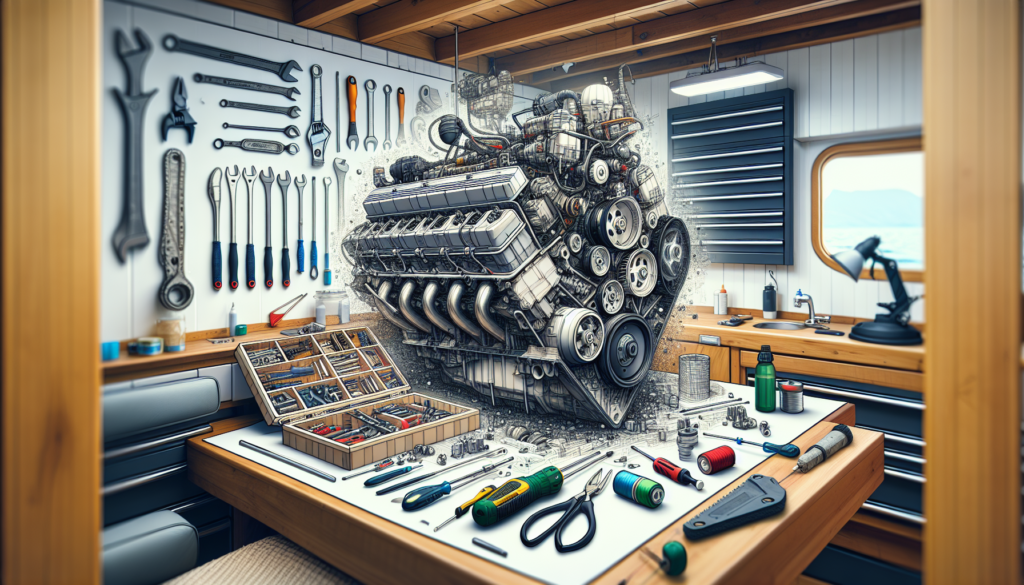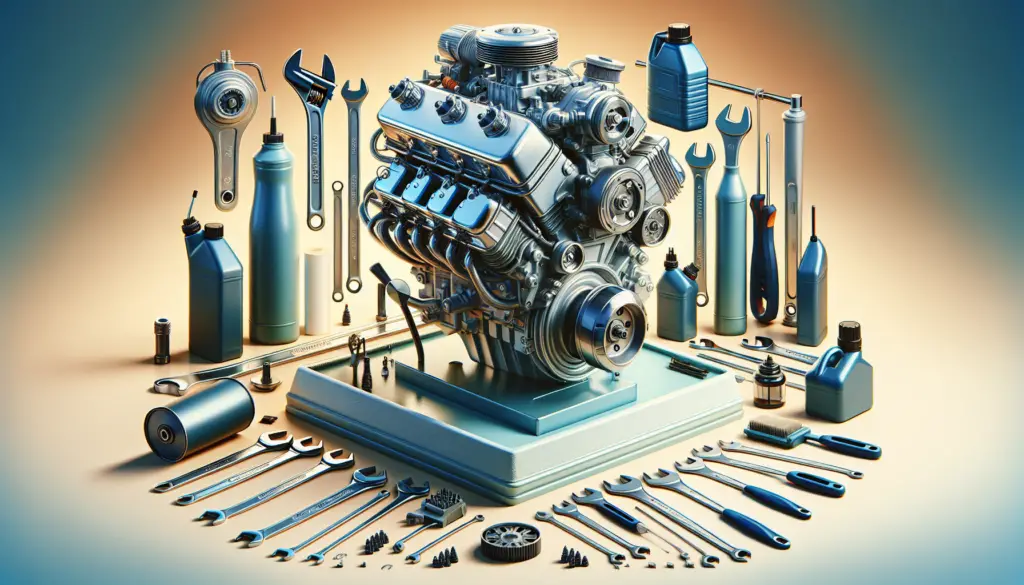Finding yourself stranded out on the water because your boat engine decided to give up the ghost is a situation you definitely want to avoid. Thankfully, you don’t have to be a seasoned mechanic to keep it in great shape. If you’re a beginner at this, you’ve come to the right place. The article “DIY Boat Engine Maintenance Tips for Beginners” provides essential advice on maintaining your boat engine. From regular checks to cleaning and necessary replacements, you’ll get a grip on these tasks in no time. You will find it’s much easier to enjoy your time on the water when you know your engine is well cared for.

Understanding Your Boat Engine
Boating is not merely about steering the wheel. It’s about understanding the heart of your boat – the engine. By knowing its ins-and-outs, you lay the groundwork for efficient troubleshooting and maintenance.
Parts of a boat engine
Like any machine, your boat engine is an assembly of various parts designed to function in sync. The key components include the cylinder, where fuel combustion happens, and the piston, which creates the necessary forward push. The valves control the intake of fuel and exhaust of fumes. The crankshaft and camshaft are gears linked to the pistons, translating the pistonic motion into rotary motion, driving the boat’s propeller.
Types of boat engines
Now, all engines aren’t same. Depending on your boating needs, you’ll be using one of three types. Outboard motors are attached externally to the stern, feature an integral gearbox and propulsion system, and are common on smaller boats. Inboard engines, as the name implies, are built inside the boat and require a separate propeller and steering system. Lastly, inboard/outboard engines (or sterndrives) combine traits of their counterparts, offering compactness and easy access for maintenance.
Functioning of a boat engine
Regardless of the type, all boat engines work on basic physics. Fuel (gas or diesel) is ignited in the cylinder, causing a forceful explosion. This explosion pushes the piston, which in turn moves the crankshaft. The rotational movement is transferred to the propeller, propelling the boat forward. It’s simple, yet fascinating!
Safety Measures Before Working on Your Boat Engine
Safety should never take a back seat. Here are some key precautions before you roll up your sleeves to work on your boat engine.
Handling the engine safely
Firstly, make sure the engine is turned off before you start any work. Postpone any maintenance tasks if the engine is hot to avoid burns. Always disconnect the battery to prevent unintentional sparking.
Essential safety gear
Equally important is safety gear. Don some sturdy gloves to protect your hands, safety glasses to shield your eyes from accidental sprays or debris, and wear a safety apron to keep your clothes oil-free.
Ensuring the boat is secure
Last but not least, confirm that your boat is secure – either moored securely at the dock or stabilised on solid ground if it’s out of the water. Unstable or rocking boats can lead to accidents.
Basic Boat Engine Maintenance Supplies
Regular maintenance can extend the life of your engine significantly. Here are some essentials to have at hand.
Types of oils
Your engine requires specific types of oil based on its RPM range and the outdoor temperature. High-RPM engines require a lighter, less viscous oil while low-RPM engines need the heavier, more viscous variant.
Cleaning supplies
Keeping your engine spick-and-span can make a huge difference. Investing in quality cleaning solvents, brushes, and rust preventatives is a no-brainer.
Replacement parts
Keep a small stock of frequently replaced parts like spark plugs, filters, and belts. It can save you from getting stuck in the middle of nowhere!
Various tools required
Last but not least, stock up on a toolkit including wrenches, screwdrivers, pliers, and a spark plug gap gauge among others.
Changing the Engine Oil
engine oil changes are important for keeping your engine running smoothly. Here’s how to go about it.
When to change engine oil
Typically, engine oil should be changed every 50 to 100 hours of engine operation, or at least once a year. It may vary based on the engine type, usage, and manufacturer’s guidelines, so always keep an eye on the engine hour meter.
Steps for changing engine oil
You’ll need an approved oil-change system to remove the old oil. Then, you can refill with fresh oil through the oil fill port. Always double-check the oil level with the dipstick to avoid overfilling.
Safe disposal of used oil
Do remember that engine oil is hazardous waste. Store it in an approved container and dispose of it at a recycling facility or marina that accepts used oil.

Inspecting and Changing Spark Plugs
Spark plugs are crucial for ignition. Here’s how to maintain them.
Identifying faulty spark plugs
If your engine misfires, idles rough, consumes more fuel, or is hard to start, it could indicate a failing spark plug. Signs of wear or carbon deposits on plugs hint towards replacement time.
Removing old spark plugs
Use a spark plug socket to carefully unscrew and remove the old plugs. Ensure the engine is cool to prevent thread damage.
Installing new spark plugs
Before you install the new spark plugs, check and adjust the gap as per manufacturers’ specifications with a gap gauge. Then, hand-thread them in place before tightening them with the socket.
Cleaning the Engine
Regular cleaning keeps your engine healthy and happy. Here’s how to do it right.
Deciding on a proper cleaning routine
A good rule of thumb is to clean your engine after every outing. However the frequency may depend on factors such as saltwater exposure and amount of use.
Tips for cleaning your engine
Always start with a cool engine. Remove any loose dirt or debris, then scrub with a brush and solvent. Rinase thoroughly with water (avoiding electrical parts) and dry with compressed air.
Dealing with corrosion
For corrosion spots, remove the rust with a wire brush and apply anti-rust spray. Regular application of wax or silicone spray can also help prevent rusting.

Checking and Maintaining the Cooling System
A reliable cooling system is crucial to prevent your engine from overheating.
Understanding the importance of the cooling system
The cooling system circulates water around the engine’s hottest parts, helping maintain the optimal operating temperature.
Checking for blockages
Inspect the water pump and impeller for any wear or damage. Ensure that the cooling passages are free of debris or corrosion.
Maintaining the cooling system
For saltwater boating, flushing the system with fresh water after each use can significantly curb corrosion. Remember to check coolant levels and refill or replace as per your manufacturer’s guidelines.
Inspecting and Replacing Fuel Filters
Your engine requires clean fuel, and that’s where fuel filters come in.
Understanding the function of fuel filters
Fuel filters strain out any debris, keeping the fuel supply to your engine clean, and enhancing its performance and lifespan.
When to replace fuel filters
Changing fuel filters at set intervals (often annually) is advisable. Carefully monitor if your engine shows signs of clogged filters like hard starting or performance loss.
Steps to replace the fuel filters
Turn off the fuel supply, unscrew the old filter and replace it with a new one. Remember to cautiously monitor for fuel leaks during the next engine operation.

Checking the Belts
Keeping the belts in good condition ensures a smooth engine operation.
Identifying worn-out belts
Inspect belts for sings of wear and tear like fraying, cracking or stretching. If a belt leaves significant dust on your finger upon rubbing, it’s time for a replacement.
Replacement of belts
Loosen the tensioner, remove the old belt and install the new one. Always keep the belt tension as recommended by the manufacturer.
Maintaining the belts properly
Regular inspections, keeping the belts clean and avoiding excessive tightening can enhance their service life.
Seeking Professional Help
Finally, it’s important to know when to call in the pros.
When to seek professional help
For certain jobs involving electrical systems, fuel leaks, or engine disassembly, it’s wise to hire a professional.
Troubleshooting larger issues
A sudden drop in your boat’s speed or performance indicates a potential major problem and should be examined by an expert.
Maintaining a good relationship with a marine mechanic
Building a good rapport with a reliable marine mechanic can be a lifesaver – literally. They can guide you through any complexities and ensure your boat stays seaworthy.
So there you have it – a comprehensive guide to understanding and maintaining your boat engine. With a little bit of time and effort, you can keep your engine purring and enjoy smooth, unhindered boating adventures. Happy boating!

